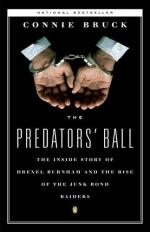
|
| Name: _________________________ | Period: ___________________ |
This test consists of 15 multiple choice questions and 5 short answer questions.
Multiple Choice Questions
1. What was the purpose of Fred Joseph's meeting at the Barbizon Plaza in New York?
(a) gathering inside information to take back to Los Angeles
(b) pirating talent from some of the biggest firms on Wall Street
(c) to undermine Milken and take over control of the Department
(d) consideration of all ideas, even the far-out and the flamboyant, instead of the conservative
2. What did Milken and Joseph devise to keep business flowing during the recession?
(a) ways of trading abroad
(b) different kinds of instruments
(c) finance services for the largest clients
(d) better communications with clients
3. What was the average net worth of members of Milken's core group after being with him five years?
(a) $12 million
(b) $20 million
(c) $10 million
(d) $5 million
4. What was the result of changes in the investment banking industry in the 1970s?
(a) Firms became highly competitive and business moved around.
(b) Business concentrated in New York and Los Angeles.
(c) Many new firms came into existence and were soon taken over.
(d) Regulations now made it harder to trade in junk bonds.
5. Why did Drexel remain a privately-held company?
(a) Milken could then retain his need for secrecy.
(b) It was too much of a temptation for a hostile takeover.
(c) They did not want outsiders to get in on their business.
(d) Joseph refused to allow it to happen.
6. What did Milken offer this market segment?
(a) a hope for recovery
(b) a protection from takeover
(c) a new kind of debt instrument
(d) ten cents on the dollar
7. What was the estate they bought?
(a) the Pickford estate
(b) the Jackie Coogan estate
(c) the Clark Gable-Carole Lombard estate
(d) the Judy Garland estate
8. What did Joseph need to achieve his goal of making Drexel a world-class institution?
(a) to learn the definition of leveraged buyouts
(b) to get into M&A
(c) to stop dealing in junk bonds
(d) to mastermind an M&A for Drexel
9. How did Milken break into the Las Vegas gambling business community?
(a) Milken helped Steve Wynn raise the funds he needed to build in Atlantic City.
(b) Milken lowered his commissions to get large casino business.
(c) Milken traveled every weekend to gamble in Las Vegas.
(d) Milken showed the casino owners how they could double their income.
10. Who was Dr. Feelgood of Drexel?
(a) Fred Joseph
(b) Tubby Burnham
(c) Michael Milken
(d) Lowell Milken
11. What was Fred Joseph's strategy for hiring employees for Drexel?
(a) overhiring to learn which are the ones to keep
(b) hiring from the smaller firms so that they saw it as a step up
(c) paying higher commissions than anyone else
(d) getting recommendations from bigger firms
12. How did Milken decide to help Peltz?
(a) by loaning him $10 million from his personal fortune
(b) by underwriting $100 million in junk bonds for Triangle
(c) by advision him how to avoid bankruptcy
(d) by making him a partner in his bond business
13. Where was much of the money coming from for takeovers in the 1980s?
(a) foreign investors with extra capital
(b) the break up and sale of raided company divisions
(c) fake junk bonds imitating Milken's bonds
(d) big blind pools that Milken would raise for his customers
14. Why did Ichan and Kingsley limit themselves to 4.9% of shares in companies?
(a) 4 and 9 were Carl Icahn's lucky numbers
(b) 4.9% was below the SEC reporting limit on 13d disclosure documents
(c) that was all they could afford without getting financing
(d) they wanted to keep a low profile in takeover bids
15. Why did Posner back out of the National Can deal?
(a) He decided on another acquisition.
(b) Drexel worked against him.
(c) He was diagnosed with cancer.
(d) One of his companies went bankrupt.
Short Answer Questions
1. How did bondholders often operate in noncompliance with SEC rules?
2. Who informed the SEC that he was attempting to gain control of Triagle Acquisition Corporation?
3. What did Milken refuse to have in the Drexel annual report?
4. What commission did Drexel make on these funds?
5. Why was Drexel Burnham's investment banking business diminished by 1975?
|
This section contains 714 words (approx. 3 pages at 300 words per page) |

|




